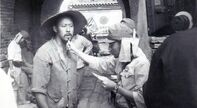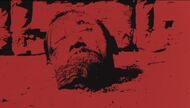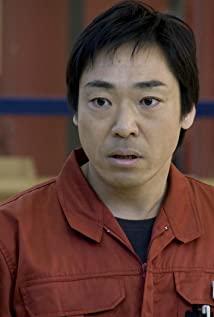"What is obscenity? Obscenity is the hallucination of having no sexual ability or possibility, but a whimsical shaking head against a certain sex object (AQ to Wu Ma, Ma Xiaojun's youthful vision of Milan in "Sunny Days"). Acknowledgment of the past Shame (possibility or impotence) is not embarrassing. What is shameful is that we dare not look back and face the shame. Could it be that we have supreme power?! In fact, we used to have nothing, nothing, we were once humiliated, However, acknowledging the shame is to no longer shame, and adultery can only be counterproductive.” (quoted from the online "Devil Coming" film review "The Obscenity and Screaming Out of Nothing") The body is in a cultural variant with declining functions and even internal decay. Among them, where do we get the power we desire? In the supreme glory of thousands of years of spring and autumn dreams meticulously whitewashed by adulterers? Or from the pain and shame of facing the true history and the roots of human nature? Jiang Wen's "The Devil Is Coming" may give us some heavy and dark enlightenment... In 1998, Jiang Wen, who had been dormant as a director for 5 years, once again attacked, directing and starring in the new work "The Devil is Coming". If "Sunny Day" is somewhat flashy, this "Devil Is Coming", which pierces the dark viscera of history like a sharp blade, is extremely exciting. Whether it is Jiang Wen's performing art or his directing art, he has achieved the ultimate in this film, and his personal genius is breathtaking. The whole film was shot with black and white negatives. Jiang Wen said that traditional Chinese movies emphasize color aesthetics. He wants to remove the color packaging, and the Chinese have yellow skin and dark eyes. The effect is similar in black and white or color films. Some foreign reporters once questioned the length of the film. Jiang Wen said that 500,000 feet of film was used during the shooting. Jiang Wen felt that the current length was just right, and then he ridiculed himself and said that someone would ask him to trim it anyway. But so far, it seems that Jiang Wen has not even obtained the opportunity to trim, because the film has been completely banned in the mainland. It has been four years since "Devil is Coming". The road it has traveled can be described as muddy and tortuous, with constant topics: The film was completed in 1999, and was accused of harming the image of the Chinese during the domestic review and was under pressure to modify it. In April 2000, Jiang Wen failed to pass the censorship but sent the film privately to the 53rd Cannes International Film Festival, which aroused the disgust of the National Film Bureau and asked the three production companies to withdraw the film from the Cannes Film Festival, but he did not expect the film. But in one fell swoop won the Jury Prize at the Cannes Film Festival. On April 27, 2002, "The Devil Is Coming" was officially released in Japan. Prior to this, the five violent groups in Japan had sent a fax to the distribution company, saying that the film would not be screened in Japan. Ensure the safety of Japanese actors. Due to the great impact of "The Devil Is Coming", many Japanese theaters often have chaotic scenes after its screenings. The different emotions of the viewers are very sharply opposed, and a Japanese film critic pointed out: "Appreciation The chaos afterwards is the proof of the masterpiece." Ten percent of "The Devil Is Coming" is based on the novel "Survival" by the mainland writer You Fengwei, while the other parts are composed of Jiang Wen and three other screenwriters who listened to local old people's stories. The story takes place in a remote village named Gujiatai near Shanhaiguan Pass in Hebei Province at the end of the Anti-Japanese War. One night, Ma Dasanzheng, a villager played by Jiang Wen, had an affair with Yu'er, a beautiful young widow in the village, on his kang. At this time, a person knocked on the door, and he threw two sacks containing prisoners to Ma Dasan's house, one of which was the Japanese officer Hanaya Kosaburo, and the other interpreter Dong Hanchen. Originally, the person agreed to come to fetch people after eight days, but there was no news since then... After the two captives were kept in the village for a long time, the villagers discussed that they should be put to death to avoid trouble. The Japanese soldier Hanaya Kosaburo also decided to die for the country at first. In order to get Ma Dasan to kill him, he asked the translator to teach him a few words of curse. The translation was translated as self-preservation but taught him a few words of flattery, so I saw Hanaya. He said viciously: "Big Brother and Sister-in-law, Happy New Year! You are my father, and I am your son!"-The huge absurdity that words can produce at this moment is full. After many attempts to execute the two were unsuccessful, the villagers also believed that they deserved their lives, and kept the two prisoners secretly detained in the village. Six months later, Hanaya Kosaburo decided to repay Ma Dasan and the villagers for not killing, and proposed to complete a deal with the villagers: the villagers would return him and the interpreter to the gendarmerie, while the Japanese army provided two carts of food. In exchange. Under Ma Dasan's proposal, after some discussions, the villagers accepted the conditions of the flower house and signed the contract. In the lighting treatment of the scene where the villagers signed the contract with Hanaya Kosaburo and the translator Dong Hanchen, Jiang Wenyi reversed the usual film expression technique (the use of the light on the bad person’s face can express his hideous appearance), and he gave the villagers gathered together. The face also used the bottom light, the human face in the swaying dim light was like a ghost, and there were several signs of extinction...The people escorted the two prisoners back to the gendarmerie. The plot at this time is extremely funny. When the villagers and prisoners arrived at the headquarters of the Japanese military police and were negotiating with the Japanese army, the situation suddenly went into turmoil. War horse... Although the captain of the Japanese gendarmerie felt insulting the Bushido spirit, he still agreed to fulfill the agreement and led his troops to send food to Gujiatai. When the grain arrived in the village, the Japanese army called the whole village to drink and celebrate, sharing food and drink. When the celebration was halfway through, the Japanese army suddenly began to slaughter the villagers frantically, and the whole village was turned into a bloody slaughterhouse. Then they set fire to the mountain village to ashes. In this catastrophe, only Ma Dasan and the pregnant fish survived. Soon, the Kuomintang army arrived. They first tried and executed the translator Dong Hanchen in public, and then took over most of the Japanese prisoners, including the troops where Hana was located. On a heavy rainy day, Ma Dasan disguised as a smoker and rushed into the Japanese prison camp with a sharp axe. He was eventually captured by the Kuomintang soldiers and sentenced to death. The judge was still the same Kuomintang officer who pronounced and translated Dong Hanchen a few days ago. This Kuomintang officer, played by the famous Taiwanese TV host Wu Dawei, said in a funny tone that Ma Dasan’s behavior violated the recent announcement. Announcement of the International Convention Potsdam. On the day when the sentence was pronounced, many people watched. While Wu Dawei was speaking, a pig got under the crotch of a Kuomintang soldier who was maintaining order on the scene and turned it over. All the onlookers burst into laughter. Then Ma Dasan was beheaded to death in the indifferent eyes of everyone, and the execution was the Hanaya Kosaburo who had been with them day and night... The most tragic and majestic reversal in the film is in the last picture. When director Jiang Wen perfectly dominated the story wandering in darkness and brightness, ignorance and awakening with the contrast of black and white, he painted a layer of amazing color: the world became blood red in an instant-this extremely subjective 'S amazing perspective comes from the eyes of the head of Ma Dasan who fell to the ground. "Just for the last picture, it is worth making the whole movie into a black and white film," Jiang Wen confirmed, "The last red is of course red blood and red flags. We spent a lot of time on this. When we watched it in color Compared with the pure black and white scenes shot on film, the red is very light, lacks a sense of dignity, and even a little cheesy. So I tend to choose a supernatural color, and finally we did it with the help of a computer." "I have read a book called "Past Life and This Life" and think this movie can be regarded as my'past life'. Why? Because when I was filming, I shared a language with people who lived in that era. I feel like experience However, I can smell that smell and feel the light at that time. Even when I was filming, I told the Japanese actor who played the Japanese soldier, can you say this sentence in the sound with a "Ga", yes There is no such a turning tone. He said several words with the same meaning, and finally I chose one. He told me that it was an Osaka accent and was not often used. And he was acting as a soldier from Osaka . I don’t understand Japanese. Where do you think I got this feeling? So, I believe that people may span time in some extreme situations of creation. Later I watched "Toshiro’s Diary" and I found his inner activities and When I made the script, I thought exactly the same-time is not impossible to cross." Although Jiang Wen has repeatedly claimed that he is just an ordinary person, not a genius, he said that genius is about to die. But when you see his remarks above, and see his extreme creative state that has crossed time and space, would you deny that this macho is a real genius? There are also two types of genius: one is to live completely in the world created by oneself, unable to cope with the real world in front of them, and thus die prematurely or prematurely, such as Mozart, such as Nietzsche and Van Gogh. Another type of genius is to understand and master the rules of history and reality, so that he can easily walk in the cold and cruel world, such as Goethe, such as Picasso and Kubrick, such as "The Devil Is Coming" director and star Jiang Wen. • When watching "The Devil Is Coming", we will think of Akira Kurosawa, of American classic films that can mobilize scenes, actions and comedies with the same impact, and even suddenly think of Shakespeare’s works similar to " The character in "The Devil is Coming". In addition, the most shocking thing is that without this film, there would be no overwhelming and transcendence in the sense of artistic development and innovation. I must know this. "The Devil is Coming" is a great work. (French "New Observer" weekly review) •My wife said to me, look, the filming of "The Devil Is Coming" is very devastating to you, can you take it more relaxed? In fact, every time I make a movie, I want to relax myself. As Lu Xun said, "for the commemoration of forgetting". In "Bertolucci Says" it is also said that the purpose of shooting something is to forget it. When "Sunny Day" was filmed, the lingering feelings were locked in by me. Before shooting "The Devil Is Coming", I went to Japan. I went to the Yasukuni Shrine and went to a shop that sells katana. There are 400-year-old swords in the shop. I want to buy them. But it is a cultural relic and cannot be sold. I was accompanied by a Japanese named Yamamoto. He asked me for dinner at night, why are you interested in that knife? I said that this knife has brought fear to the Chinese people. Until now, the best way to get rid of this fear is to hold it in my hand, unite with my hand, and belong to me. (Jiang Wenyu) • I have been interested in history since I was a child. I want to shoot "The Devil Is Coming", in fact, I want to make a summary of my feelings about fear, love, and death over the past 35 years. What causes fear? In order to get rid of this fear, is it to stay away from death or close to death? These are the feelings in my head and heart for 35 years. I want to express it. It just happens to have such a story, and it’s appropriate to install it inside. It is not easy to find a particularly suitable story. The people in "The Devil Is Coming", the translator, the devil soldier, the team leader, Ma Dasan, and the village chief, are not in their original positions. Beyond his own ability, he must make a decision about his own destiny. Who can say that the problem Ma Dasan encountered was not his own? Chinese people have liked a mistake for several lifetimes. For a result they want, knowing that the reason for its existence is not sufficient and unreasonable, they first find an excuse to convince themselves, and then think that others can accept the reason. Ma Dasan is like this. He thought he had raised the Japanese for half a year, and they would definitely give him food and thank him. But others don't think so, don't think that others will follow your train of thought. (Jiang Wenyu) • When watching "The Devil Is Coming", there was a lot of laughter, but in the end, my heart was extremely heavy And depressing... From the point of view of filmmaking, Jiang Wen is great. Although "Bright Sunny Days" tells the other side of the life of teenagers during the Cultural Revolution, although this movie gave the Chinese people a lot of face, it still gave me a light-hearted feeling. "The Devil is Coming" is coming very aggressively, I mean this movie. Jiang Wen's style of documentary expression has given us an absurd survival story. He must hope that everyone who has watched the movie will be alert, not just for entertainment. An excerpt, "He not only wants us to be wary of the Japanese, but ordinary Chinese can see it; he wants us to be wary of ourselves, wary of our innocence and fluke, and good at forgetting."... ("Non-Music" "Extreme Film" "Comment) • "The Devil Is Coming" describes the peculiar exchanges between Chinese farmers and the Japanese army in the form of black and white films, highlighting the fission of human nature when facing death in the war. The language of the whole film is humorous, the thought is deep, the plot is ingeniously arranged, and it gives people a tingling feeling after watching it. It is a rare masterpiece reflecting the Sino-Japanese war in recent years. The film was called by the Japanese media as "the truth of humanity beyond national borders", while Jiang Wenren said: "I portray human misunderstandings and love and hatred, terror and death."
View more about Devils on the Doorstep reviews










